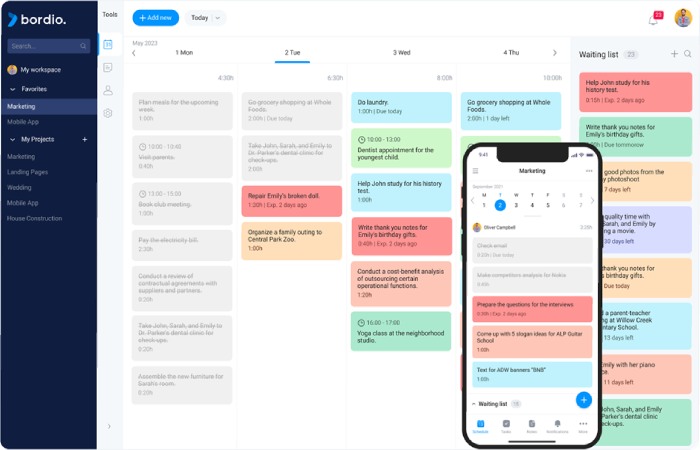Productivity is a hot topic of our century that everyone is discussing and trying to stick to. What do we mean by peak productivity? That is a particular time when our brain works on the limit of possibility to cover up the activity. We call it a flow state sometimes. How must we reach that state or stay productive in working time?
Table of Contents
Twenty-four-hour schedule.
Twenty-four hours a day, our body works in a Circadian cycle. It is a unique rhythm in which our body controls sleeping-waking time, hormone release, eating habits, body temperature, and other critical bodily functions. As this rhythm works – many people feel peaks of vigor after waking up in a few hours and peak productivity in the evening. By learning about your body and studying it, you can figure out which rhythm is the best for you and when your peak pep rises.
After a little recherche on this topic, you can create a schedule for yourself where you put your tasks after waking up, so it will be easier for you to perform your duties. First, I advise using online resources to make a to-do list and a schedule, such as Bordio – an excellent online task tracker. There you can also set times and reminders.

In addition, our mental and cognitive abilities are limited – during the day, we use them to exhaust the limit. Using them for too long will bore you and make you procrastinate. It’s worth remembering when to stop and do things gradually – preferably soon after awakening when you are most effective.
Chronotypes and body characteristics.
Different people have different modes, some people will be happy to get up early, but for others, it will be unbearably hard. It all depends on the different chronotypes of people. The world is more adapted to people with a chronotype of “skylark.” These people wake up early and are very productive at the beginning of the day, while they deplete their energy in the evening.
These people are more easily given the usual work mode, office mode, and studies. There is another group of people – it is considered the most difficult for them to function in a standard mode – these are “night owls” Such people have difficulty getting up in the morning and are productive at night. There are other groups, such as “bear,” “hummingbird,” and others, but these are the two generally accepted groups. Understanding your chronotype can be vital to optimizing your productivity. It’s essential when choosing your life rhythm and profession.

Different Tasks, Different Concentrations.
Depending on the task, the best time to work on it may be different. In addition, to better select functions for yourself and think about how procrastination can indicate what you should and should not do, we can also think about prioritization.
For example, tasks that require creativity are best done when we are a little tired since our brains are more prone to thinking outside the box. It is often said that lazy people are more creative-and this is true. A slightly tired person will look for a creative approach to business – that will affect the final result. In addition, creative activity is a kind of rest for the brain. On the other hand, tasks that require concentration, analysis, and perhaps mathematical thinking are best done in an awake state. Doing any calculations is better than being awake and rested; everything should be correct.
It is impossible not to mention the method of entering the state of flux, called the “method of half an hour.” It consists of spending, in any case, only half an hour – for example, set a timer and start writing an article. After half an hour, you are more likely to continue working than if you hadn’t started. In addition, even if you interrupt after half an hour, you will know that the work has begun and be more willing to return to it later.
Lifestyle tips.
Such an important factor as our physical and mental state dramatically affects our productivity – it is important to remember that even the phone needs to be recharged. Rest is an indispensable part of a productive life.
Nutrition and Diet
Eating healthy three meals a day or intuitive eating, supporting your nutritional needs by checking and doctoring and selecting foods that are in short supply in your body. Enough protein and other nutrients in your diet.
Physical exercise
Regular exercise and keep your body healthy by stretching, perhaps at a gym or a swimming pool. Physical activity is fruitful for productivity and overall health.
Stress level.
Avoid stressful situations, take care of your mental health, and practice meditation and sessions with a psychologist to sort out your problems. Don’t let other people clutter up your life, and love yourself.
Quality and quantity of sleep
Sleep is crucial. It affects the length and quality of your life; outside, the immune system clears toxins from your brain and helps you be ready for new challenges afterward. Maintain a sleep regimen that suits you.
Bottom line.
In summary, science presents the peak of productivity individual time for each person. You should check how your circadian cycle works and which chronotype you have to achieve it. After that, setting up your excellent work and sleep schedule is necessary. Prioritizing tasks, finding out how best to do this or that thing, and entering the flow state, start working with half an hour of total concentration.
Also, to avoid burnout, it is necessary to remember your health, rest in time, control your sleep, nutrition, stress level in your life, and do physical exercises. All these things can also influence our productivity. Pay attention to your personal characteristics because the differences can be considerable. What’s suitable for some people only works for others.


Review The Science behind Peak Productivity Times.